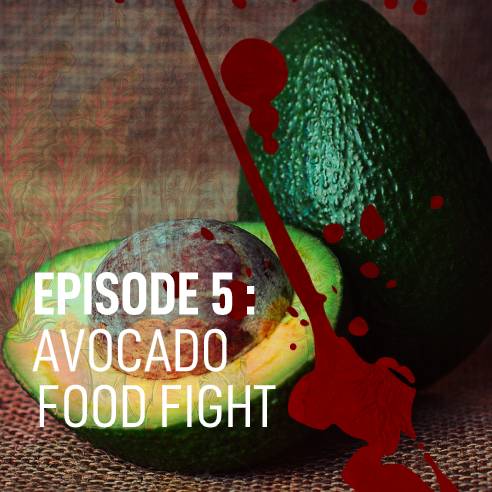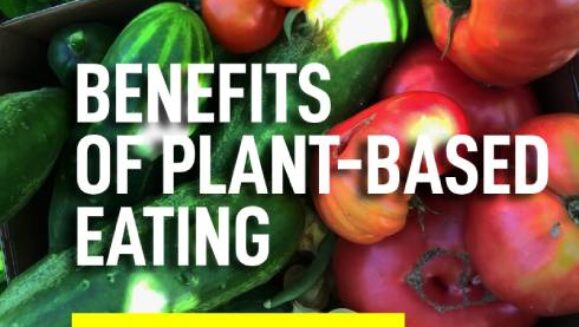Did you know there’s a food fight happening in the avocado industry?
Listen in here:
Let’s talk about it. But first…
“You can put it on toast, put it on ya salad, anyway you want, you can, you can have it…you can put it on the side, put it in yo sandwich you can mix it up any way you wanna have it….avocado, avocado, avocado…yeaaaaah and you know what’s up!”
That’s a shout out to Alton Eugene for his Avocado Song which came out in 2018…and that’s part of the reason why we love avocados. They’re delicious, they’re nutritious and they make a good topic for a catchy dance track!
Seriously though, we love avocados in this country, so much so that we import over 2 billion pounds of avocados every year from Mexico. A total of 11 billion pounds of avocados are consumed around the world. Our consumption of avocados in the US increased 7 fold from the year 2000 to 2016 and the Mexican avocado trade is worth $1.5 billion dollars annually. And as a side note…One of the most important days for avocado producers is none other than Super Bowl SundayTM. That’s right! We need our guacamole with our chips and salsa on game day.
In this episode, we’re going to dig into the avocado industry and supply chain.
If you’re like me, you probably have enjoyed eating avocados. There are at least 500 different varieties of avocados. Avocados are indigenous to Central America and the Caribbean. Interestingly, all avocados can be genetically traced back to Mexico, Guatemala and the West Indies. Some of the most popular varieties that you might see at the grocery store include the Fuerte (which is one of my favorites is a medium sized avocado with a smoother bright green skin). This is the original high quality California avocado and it got its name, meaning “strong” in Spanish because it survived the great freeze of Los Angeles, California in 1913.
There’s the mighty Hass (the most popular variety, it has dark bumpy skin and is known for its thick and creamy consistency). In fact, 95% of avocados grown in the US are Hass avocados. There’s also the Bacon avocado (which by the way tastes nothing like bacon, but probably tastes pretty good WITH bacon) but it was named after the farmer that cultivated them, James Bacon in 1951. It’s got a bumpy green skin and light colored flesh.
There’s the Monroe, a cold hardy variety, which is of Guatemalan and West Indian parentage and has a glossy smooth skin. And there’s the Reed, Pinkerton, Maluma, Zutano and many, many more.
And although avocados have been cultivated as a delicacy for hundreds of years in Mexico and for several decades in other countries and even in Florida and California, the avocado industry has unfortunately left some blood in the streets, enabled organized criminals who are fighting over territory, and it has manipulated environmental institutions causing irreversible damage to the environment where they are grow in Mexico – despite their big profits.
So, let’s dig in, shall we?
Americans eat avocados all year round – not just during Cinco de Mayo and the “big game” and demand grows every year. But for 87 years, imported avocados from Mexico were banned because they were considered to be a threat to agriculture because of the borer worm. Avocados have been around for centuries and they are native to Mexico. However in 1997 this ban was lifted and exports were boosted as a result of our NAFTA trade agreements. And by 2005, avocados were everywhere – thanks to some catchy tunes and smart marketing campaigns.
But all this is concerning not only because somewhere in America, a restaurant is charging
$19 for avocado toast…?
Which is absurd but it is what it is. If people are willing to pay, well then…$19 bucks it is. However, when we look at the avocado supply chain the fact is, the place where most of the world’s avocados are grown – which is in western Mexico – people are facing irreversible environmental impacts concerning the over extraction of water, deforestation, loss of wildlife, and they are also confronted with egregious acts of violence and corruption.
It’s a different story in California,
where the avocado growers last year yielded over 200 million pounds of avocados – which was considered a meager crop. Since avocados need an entire year to set fruit, the California wildfires, drought and floods impacted avocado production. Even though California avocado growers see massive price and yield fluctuations from year to year, which has an economic impact on them, they unfortunately are at the whim of the behemoth Mexican producers when it comes to price per pound. It’s like the dollar…the more that enter the market, the less they are worth.
So typically, avocados prices average out at $1.50 per pound. Last year, due to the air quotes, shortage in yield, prices rose to over $2 per pound…and that’s how fancy cafes can justify a $19 schmear of avocado on toast.
I remember being a kid and hating avocados…but with time I came to love them. As a chef that specialized in raw food and vegan food, they became a staple ingredient and they went in everything from gazpacho to guacamole, to smoothies, and into desserts. They are very versatile and we eat them for breakfast, lunch and dinner. Lord knows, we do!
So this is for all the folks out there that put it on their toast, put it on their sandwich and stir the guac…and then moan and groan about how meat is THE problem with our food supply chain and how it’s bad for our health and our environment…but let’s see if that’s really true, shall we?
Before we dive into that, let’s talk about the health impacts of avocados…
Overall, there’s really no debate on whether avocados are good for us or not – from a health perspective. Medical studies show that avocados contain healthy sources of Vitamins C, E, K, they contain more potassium than bananas, and also contain trace amounts of zinc, copper, magnesium, iron, Vitamin A, and thiamine, riboflavin and niacin – Vitamins B1, B2 and B3 respectively. Avocados are loaded with healthy monounsaturated heart healthy fats and 77% of the calories from avocados is from fat…so that makes it the fattiest fruit on the planet. And that’s the good news…
As a side note, the impact of COVID-19 on the avocado industry is still unclear,
but as of this recording, the number of cases in Mexico are on the rise. But with restaurant closures around the world and the slowing of imports, the avocado industry clearly isn’t the only industry feeling the pinch. Which brings us to the next question…
How is our consumption of avocados impacting economies?
We already know that the avocado trade is worth billions. We import 2 billion pounds every year, and the price of avocados is on the rise due to some very important factors – namely shortages due to weather conditions (specifically in California). In addition to shortages, the avocado business has become the new “conflict commodity” akin to “blood diamonds” where violence and corruption have taken hold of the massive avocado business. A lot of the violence that is going on in the avocado trade is a result of a few factors.
Although, the Mexican government started cracking down on the drug cartels…the cartels have been forced to fracture and now want dominance over the avocado trade which has led to some tragic outcomes…
I would be remiss if I didn’t mention how the avocado trade is impacting the health of the Mexican people who inadvertently get caught in the “turf war” over cartel controlled territories. Last year, 19 people were murdered, displayed over a bridge with 3 of the 19 found dismembered and strewn along the streets. So feel free to spread that on your toast!
How is our consumption of avocados impacting the environment?
Two avocados has an emissions footprint that is three times the footprint of your morning cappuccino with cows milk! To be fair, the total global water consumption for avocados is about one tenth of the global water consumption of coffee…but I digress. That’s a different episode.
In the avocado industry, many forest lands and wildlife are being destroyed and some forests are even burned
so that producers can change land-use permits to commercial agriculture use instead of forest land use. Earthquakes in the main region where avocados are grown have increased…and many environmental scientists suggest that due to the massive water extraction it takes to irrigate avocado plantations, the deep subsoil caverns that are left behind could be the cause of these shifts.
So, what can we do?
- We can support California grown avocados – the California Avocado Commission – which is basically a PR and marketing outfit for avocados, is launching a new campaign this year with a focus on California. So the next time you’re shopping for what the Aztecs would call ah-wa-catal – which translates to “testicle” – try and look for ones grown in California.
- We can push for legislation that imposes monitoring, fair trade wages and sustainable farming practices for avocados imported from Mexico that are sold into grocery stores in the US – kind of like what happened for coffee and chocolate!
- Revisit our trade agreements and include environmental impacts for imports – and that should be across all food supply chains, by the way.
So, that’s where I’m going to leave this…what do you think?
Would you pay $19 bucks for avocado toast? Will you still make guacamole if you can afford a $3 or $4 avocado? Will you eat fewer avocados to save a life? Will any of this information change the way you support the avocado food supply chain? Listen in to this week’s episode here! Or, check out this article for more information about the foods you love to eat…but that you don’t want to kill you!
Let me know on social media. Follow me @foodslain on Twitter, Facebook, Instagram and soon, on YouTube!
Thank you for listening in. I appreciate you being here. If you like what you hear, support this show by becoming a Patreon supporter and heading over to patreon.com/foodslain or if you’d like to make a one time donation, you can do that on foodslain.com. Or soon, you can make a purchase on the website, maybe a book, or some seeds so you can get your garden going…though I won’t be selling any avocado seeds…or leave a review for me and share these episodes with the people you love. I’d really appreciate it.
A quick shout out to my supporters and folks who have made donations! If you’re new here and haven’t listened to any past episodes, check them out on your favorite podcast platform or on foodslain.com
Stay tuned…because next week, we’re going to dig into another favorite food…maple syrup! Oh, and what a sweet little mafia it is!
Anyway, remember to eat clean, eat healthy and love your food, and I’ll see you on the other side of the plate. Chow!



